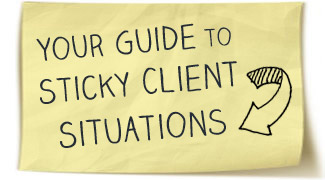Does bad credit make life more difficult and expensive? Absolutely. Is it forever? Absolutely not. Regardless of your income and expenses, you can take steps today that will make your score a little higher tomorrow and a lot higher over time.
Late payments. Maxed-out cards. Bankruptcy. Judgments. Defaults. Liens. When it comes to your credit score, nothing is more damaging than these credit sins. And damaged credit equals reduced flexibility and opportunity, especially when it comes to new loans, potential investments and oftentimes, employment.
But if you’re determined to turn a new leaf, the good news is that you can improve your credit score. You don’t need to hire a professional – in fact, be wary of so-called “experts” who say they can eliminate bankruptcies and late payments in exchange for thousands of dollars. They can’t, and you might have wasted thousands of much-needed dollars.
Regardless of your income and expenses, you can do it on your own if you have the tools. And while it’s true that credit repair sometimes means that things get worse before they get better, keep in mind these credit facts:
- A good credit score doesn’t mean you’re financially sound.
- A bad credit score doesn’t mean you’re financially foolish.
In fact, your credit score only captures how risky you are as a borrower. It doesn’t pass judgment on how much you have saved (or don’t). Low scores don’t mean you’re a bad person (or a good one). All they do is tell loan companies how likely you are to repay a loan at a given point in time.
But, as we all know, credit makes the world go ‘round. If you want a mortgage, a car loan or a credit card, you’ll need high credit scores to get the best interest rates. And since the best interest rates save you thousands of dollars – sometimes hundreds of thousands of dollars, in the case of a mortgage – it’s worth your financial while to pay attention.
Order your free credit report and review it carefully. Check for payment history and balances owed first, because they make up the bulk of your credit score. Find mistakes? Report them per the instructions attached to the report. You can also call your creditors and ask that they correct mistakes, too.
You can and should review your credit report once per year, and more if you’re applying for a loan or changing jobs. Make sure you visit AnnualCreditReport.com to get a truly free report. While sites offering free credit reports provide legitimate information, you can easily get sucked into paying expensive monthly fees for credit “maintenance.” You don’t need it, so don’t pay for it.
If your score is average to low – 680 and less — figure out what you can do to improve it. While these scores don’t always mean you can’t get a loan, it does mean banks think you’re more likely to default. Do late payments appear on your report? Are your credit cards maxed out? If so, then your credit probably damaged, at least for the short term. Excellent credit requires a long history of on-time, preferably in-full debt repayments.
Don’t stop reading if you’re a hot mess of 30-days lates and your Amex is bigger than your 401k. This is where it gets exciting, because you will have to use your best judgment. To succeed, you only need to answer one simple question:
Do I need help getting out of debt?
Your little voice knows the answer. Are your financial skills sound, and are your debts the result of years of paying for college, a divorce, medical expenses and the like? Or are your debt problems the result of years of impromptu trips to Cancun, an amazing wardrobe and Starbucks every morning?
If you have sound skills, then chances are you can do it yourself. Your best route to a credit-rich lifestyle begins with budgeting and a snowball.
Wait – what?
Yes, you read correctly. Having good credit requires managing your debt wisely, and the most effective way to pay down debt and is a technique called the debt snowball. To begin, make a list of your debts – everything from your credit cards to your student loans, auto loans and more. Next, call your lenders and ask for an interest rate reduction. Some may agree right away (like your credit card lenders) and some probably won’t (your auto or home lender). But ask anyway, because the worst they can say is no.
Begin making payments on your loans after consulting a debt snowball calculator. Vertex42.com is a wonderful free website that provides spreadsheets for a host of uses – they even have one that helps you pay off debt while you’re improving your credit at the same time – your top goal.
Here’s how the snowball works: begin your repayment plan by channeling all available funds into one loan until it’s completely paid off. You can either choose the loan with the lowest balance or the highest interest rate first – choose the biggest motivator. While you’re focusing attention on one loan, only make the minimum payments on the others (yes, I realize this advice is somewhat contradictory. Do it anyway).
When the first debt is paid, take the freed-up cash from the now-eliminated debt and apply it to the next loan on your list. Continue in this fashion – “snowballing” your payments – until your debts are paid in full. How does this improve your credit score? As your balances decrease and you demonstrate a history of on-time payments, your score rises. Bingo!
Remember, you can apply this toward all of your debts, not just credit cards. You know those ads you hear with people trumpeting how they paid off their homes in just five years? This is how they did it.
But what happens when you don’t have available cash, you’re behind on your bills and you just don’t know what to pay first? That’s when you need help. If this describes you, run, do not walk, to your phone and contact the National Foundation for Credit Counseling.
The NFCC is the country’s oldest and most widely respected debt counseling agency. When you work with the NFCC, you put the repayment process in their hands. In a debt management plan or DMP, the NFCC negotiates lower rates and payments with your creditors. You pay off your debts just like the snowball method, except the NFCC does the heavy lifting for you. Keep in mind that it’s not a loan, and the NFCC is nonprofit (although it does charge a small fee that varies depending upon your state of residence and how much you owe). Balances are paid within five years.
In exchange, you temporarily sacrifice your credit rating because your creditors will report that you’re working with a credit counseling agency. The NFCC deal will also shut your credit lines, so get used to a cash-only lifestyle – at least for a while. But when you’re finished, your credit will be better and your financial position will be stronger.
Regardless of whether you go it alone or get help, do not miss a payment. Ever. Why? Because on-time payments and balances owed account for 65 percent of your score. That’s why making on-time payments improves your score. Even consumers with bankruptcies, judgments and settlements can recover if they pay on time, all the time.
If your financial situation is so tenuous that you are seriously considering bankruptcy, or you are struggling to put food on the table and need to know what to pay first, your credit score is the least of your problems. If this describes you, you’re not alone. Here is your Official Bill Payment Order of Operations:
- Your house, your grocery bill, your electric and your heat come first. Include your car on this list if you need it to get to work. Everything after this is gravy if you are in deep trouble.
- Contract payments come next. That means your cell phone bill – you can cancel your house phone and cable service if you have to. And it’s free to surf the web at the library.
- Credit cards and other unsecured loans are a distant – distant! – third. Keep in mind that if you declare bankruptcy, the court will most likely eliminate your unsecured debts. So if it’s a choice between your mortgage and your credit card, your mortgage comes first.
When your debts are repaid and you’re back on your feet you can rebuild both your score and your emergency fund. Once your emergency fund is set, continue or begin making contributions to a tax-advantaged retirement fund. If you stay out of debt, make your payments on time and maintain a car or home loan (preferably both), your score will be in excellent territory in as little as three years.
While defaulting on your obligations will send you into credit oblivion, it may be necessary to keep you on your feet. But no matter how bad your credit is, and no matter how much you owe, do not ever liquidate your retirement account to pay off debt because you want a better credit score. Federal law protects these assets from creditors if you declare bankruptcy. Most importantly, credit can be rebuilt much easier than a depleted 401k.
Lastly, even if you have a bankruptcy or defaults, the deeper in the past they are the less your score will be affected. If you need help, ask for it. If you can manage on your own, start right now. It is never too late – or too soon – to build a pristine credit score.






